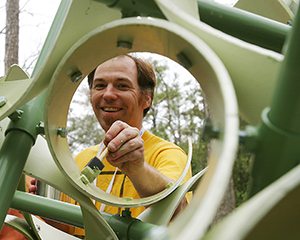
FAYETTEVILLE, Ark. – Chaim Goodman-Strauss, a mathematics professor in the J. William Fulbright College of Arts and Sciences, will explore the way in which seemingly banal objects, such as salt, string, a fork, dice and plastic bags, can open up discussions on much larger themes in a lecture titled “Little Things that Changed the World.”
The lecture is scheduled for 5:15 p.m. Wednesday, Feb. 12, in the Gearhart Hall Auditorium (GEAR 26).
This talk will preview Goodman-Strauss’ fall 2020 Honors College Signature Seminar, Little Things That Changed the World, which will examine how small, commonplace items can open a window on the human experience over time.
“Take the sugar cube – once a treasure in the global luxury goods trade, then a driver of empire, genocide and an especially brutal form of slavery,” Goodman-Strauss said. “More recently, it became a standardized staple for a rising middle class, a symbol of 1960s psychedelic culture, and today it’s a heavily subsidized agribusiness commodity.”
Even earlier, in the “String Revolution” that began at least 44,000 years ago, people worked out how to make rope, thread, needle, cloth, nets, snares, lines, bags, straps and handles, not to mention embroidery, beadwork and other adornment.
“We have the idea of ancient technology being stone tools, used for hunting, because that’s what has come down to us,” Goodman-Strauss said. “But it was much more than that.”
Many items in use today, such as a leash, gears and other tools, and foodstuffs such as sauerkraut and beer, will be examined by Goodman-Strauss as gateways that connect our present to our past.
“I view all of this stuff as metaphor for a much bigger discussion,” Goodman-Strauss said. “We’re not so much standing on the shoulders of giants but benefiting from the enterprise of millions and millions of people. It’s humbling.”
 |
| Chaim Goodman-Strauss |
Goodman-Strauss came to the University of Arkansas in 1994 after earning his Ph.D. in knot theory at the University of Texas at Austin. Goodman-Strauss served as chair of the Department of Mathematical Sciences from 2008-2015 and teaches a wide variety of courses at different levels. He studies matching rule tilings at an intersection of discrete geometry, foundational logic and theoretical computer science, publishing a key paper in the field in The Annals of Mathematics. With John. H. Conway and Heidi Burgiel, he is a coauthor of The Symmetries of Things. Goodman-Strauss is also a mathematical illustrator and sculptor. Since 2008 the Gathering 4 Gardner has commissioned participatory sculpture assemblies from Goodman-Strauss working with Eugene Sargent. On campus, you can see his work in Champions Hall and at the Arkansas Research and Technology Park.
SIgnature Seminars Explore Diverse Topics
Goodman-Strauss’ Little Things is one of four Honors College Signature Seminars scheduled for fall 2020. Other topics will include:
- Animal Minds, taught by Ed Minar, professor and chair of the Department of Philosophy
- Bad Medicine, taught by Trish Starks, professor in the Department of History and director of the Arkansas Humanities Center
- Intimacies, taught by Lisa M. Corrigan, associate professor in the Department of Communication and director of the Gender Studies Program
Deans of each college may nominate professors to participate in this program, and those who are selected to teach will become Dean’s Fellows in the Honors College.
The Honors College brings in leading scholars from other institutions to teach some of these courses, including Elizabeth Hellmuth Margulis, professor of music at Princeton University, who will lead a fifth Signature Seminar, Brain and Music, during the August 2020 intersession.
Honors students must apply to participate, and those selected will be designated Dean’s Signature Scholars. The course application is posted online on the Signature Seminars web page. The deadline to apply is 11:59 p.m. Friday, April 3.
About the Honors College: Established in 2002, the University of Arkansas Honors College helps the university’s top undergraduate students excel academically, flourish personally and experience a world of opportunities. Each year the Honors College awards up to 90 freshman fellowships that provide $72,000 over four years, and more than $1 million in undergraduate research and study abroad grants. The Honors College is nationally recognized for the high caliber of students it admits and graduates. Honors students enjoy small, in-depth classes, and programs are offered in all disciplines, tailored to students’ academic interests, with interdisciplinary collaborations encouraged. Fifty percent of Honors College graduates have studied abroad and 100 percent of them have engaged in mentored research.
About the University of Arkansas: The University of Arkansas provides an internationally competitive education for undergraduate and graduate students in more than 200 academic programs. The university contributes new knowledge, economic development, basic and applied research, and creative activity while also providing service to academic and professional disciplines. The Carnegie Foundation classifies the University of Arkansas among fewer than 3% of colleges and universities in America that have the highest level of research activity. U.S. News & World Report ranks the University of Arkansas among its top American public research universities. Founded in 1871, the University of Arkansas comprises 10 colleges and schools and maintains a low student-to-faculty ratio that promotes personal attention and close mentoring.
Topics
Contacts
Kendall Curlee, director of communications
Honors College
479-575-2024,
kcurlee@uark.edu